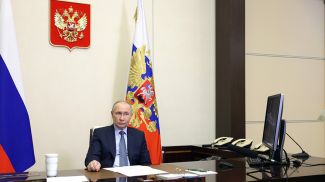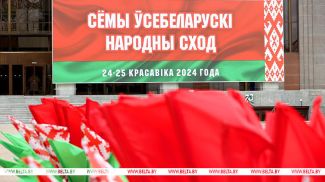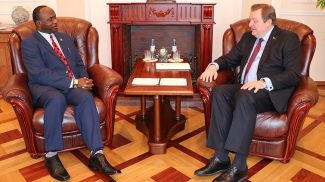MINSK, 15 June (BelTA) – The situation around the construction of the Belarusian nuclear power plant is extremely politicized. Deputy Prime Minister of Belarus Vladimir Semashko made the relevant statement on the sidelines of the seventh session of the Meeting of the Parties to the Espoo Convention on 15 June, BelTA has learned.
Asked whether any progress has been secured in discussing the Belarusian-Lithuanian issue, Vladimir Semashko said that no final solution is available yet. “I don't want to foresee the decision that may emerge. There are many options but I'd like to note that the process is extremely politically charged,” said the deputy prime minister.
Discussions about draft decisions of the Meeting of the Parties to the Espoo Convention began on 14 June. The Belarusian issue was discussed among other things.
Vladimir Semashko said that Lithuanian Environment Minister Kestutis Navickas would arrive for the final part of the Meeting of the Parties to the Espoo Convention. “He will make comments about the passing of the decision. But who else but us, the Belarusian nation, the Belarusian state, who have been affected by the Chernobyl catastrophe the most, can better understand how the construction of a nuclear power plant should proceed and how all the requirements arising out of mankind's sad experience of the last 40 years should be implemented? We observed all the requirements when we were choosing the nuclear power plant design and the site of construction,” Vladimir Semashko said.
The deputy prime minister pointed out that the Espoo Convention is a body that takes care of all environmental matters that may concern nuclear power plants, chemical factories, and other kinds of enterprises. “But they are not the experts specializing in nuclear energy. The evaluation of the International Atomic Energy Agency, which has already carried out several inspections, is extremely important for us in that regard. The IAEA head visited Belarus last year. He began his speech in Ostrovets by saying that 35 countries have nuclear power plants now and 32 countries are at various stages of joining this club of nuclear powers. Among them the IAEA singles out two countries — Belarus and Saudi Arabia. The two countries have approached the matter most wisely, including the choice of the site, the choice of the design, and its implementation,” remarked Vladimir Semashko.
The deputy prime minister went on saying that the report released after one of the latest IAEA inspections contained no criticism. “And [the Russian nuclear energy corporation] Rosatom cites our nuclear power plant as an example to follow. The opinion of the IAEA, the opinion of international experts in nuclear energy is important for us but the opinion of the Espoo Convention is important as well,” he stated.
The 7th session of the Meeting of the Parties to the Espoo Convention is scheduled to take place in Minsk on 13-16 June. About 200 people representing 45 countries parties to the Espoo Convention are taking part in the events. Among them are ministers and deputy ministers of environmental protection ministries and other agencies, high-ranking officials of international organizations and financial institutions, representatives of the general public.
The Convention on Environmental Impact Assessment in a Transboundary Context was adopted in Espoo, Finland on 25 February 1991 to come into force on 10 September 1997. It has been ratified by 45 countries. The Espoo Convention obliges the signatories to carry out an environmental impact assessment of certain activities at an early stage of planning. It also lays down general obligations of the parties to the Convention to notify and consult each other on all major projects under consideration if such projects are likely to adversely affect the environment beyond national borders.











